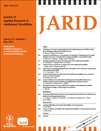
JOURNAL OF APPLIED RESEARCH IN INTELLECTUAL DISABILITIES
Scope & Guideline
Fostering Excellence in Disability Research and Practice.
Introduction
Aims and Scopes
- Health and Well-being:
Research addressing health disparities, mental health issues, physical health interventions, and the overall well-being of individuals with intellectual disabilities, including their unique healthcare needs. - Social Inclusion and Participation:
Studies that explore the social integration of individuals with intellectual disabilities into communities, including barriers to participation and strategies for enhancing social inclusion. - Educational and Vocational Support:
Research focused on educational interventions, vocational training, and employment opportunities for individuals with intellectual disabilities, emphasizing inclusive education practices and the development of life skills. - Family and Caregiver Support:
Exploration of the experiences, challenges, and support needs of families and caregivers of individuals with intellectual disabilities, including parental perspectives on care and advocacy. - Behavioral Interventions and Support:
Research on behavioral therapies, interventions, and support strategies aimed at addressing challenging behaviors and enhancing quality of life for individuals with intellectual disabilities. - Policy and Advocacy:
Studies that evaluate the impact of policies on the lives of individuals with intellectual disabilities and advocate for rights and better services.
Trending and Emerging
- Technology in Support Services:
The integration of technology in supporting individuals with intellectual disabilities is a growing theme, with studies exploring telehealth, assistive technologies, and digital tools that facilitate communication and engagement. - Mental Health Awareness:
There is a significant increase in research addressing mental health issues among individuals with intellectual disabilities, focusing on interventions and support systems tailored to their unique needs. - Self-Advocacy and Empowerment:
Emerging research emphasizes the importance of self-advocacy and empowerment for individuals with intellectual disabilities, promoting their voices in decision-making processes and service design. - Intersectionality in Disability Studies:
An increasing focus on the intersectionality of disability with other social identities (such as race, gender, and socioeconomic status) is evident, highlighting the need for inclusive practices that address diverse experiences. - Family-Centered Approaches:
Research is trending towards family-centered models of support, recognizing the critical role families play in the lives of individuals with intellectual disabilities and the need for support systems that empower both individuals and their families.
Declining or Waning
- Traditional Institutional Care Models:
Research focusing on institutional care settings has decreased, reflecting a broader societal shift towards community-based living and support models for individuals with intellectual disabilities. - Generalized Behavioral Interventions:
There appears to be a waning emphasis on generalized behavioral interventions without specific contextual adaptation, as more tailored approaches are being prioritized. - Medicalized Perspectives:
Themes that treat intellectual disabilities primarily through a medical lens, rather than a holistic or person-centered approach, are less frequent, indicating a shift towards broader sociocultural considerations. - Single-Dimensional Assessments:
There is a noticeable decline in studies that rely solely on traditional, narrow assessment methods, as the field moves towards more comprehensive, multidimensional approaches. - Static Models of Disability:
The focus on static models that do not account for the dynamic nature of disability experiences is declining, as researchers increasingly advocate for models that embrace the complexity and variability of individual experiences.
Similar Journals
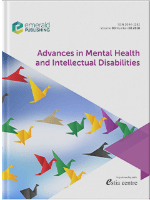
Advances in Mental Health and Intellectual Disabilities
Advancing knowledge at the intersection of mental health and intellectual disabilities.Advances in Mental Health and Intellectual Disabilities, published by EMERALD GROUP PUBLISHING LTD, is a vital academic journal that focuses on the intersection of mental health and intellectual disabilities. With an ISSN of 2044-1282 and an E-ISSN of 2044-1290, the journal provides a platform for innovative research and critical discussions from 2010 to 2024. Positioned in the Q3 category for Psychiatry and Mental Health, it ranks #389 out of 567 journals in its field on Scopus, placing it in the 31st percentile, which underscores its relevance amidst the growing body of research. The journal aims to disseminate high-quality empirical studies, review articles, and case studies that contribute to the improvement of mental health practices and policies affecting individuals with intellectual disabilities. Despite its current non-open access status, it remains a crucial resource for researchers, professionals, and students dedicated to advancing knowledge and promoting best practices within this important area of healthcare.
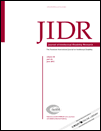
JOURNAL OF INTELLECTUAL DISABILITY RESEARCH
Advancing understanding in intellectual disability research.JOURNAL OF INTELLECTUAL DISABILITY RESEARCH is a premier scholarly publication that serves as a vital platform for interdisciplinary research in the fields of intellectual disabilities, rehabilitation, neurology, and mental health. Published by Wiley, the journal boasts an impressive reputation, evidenced by its latest Scopus rankings, which place it in the Q1 category in Arts and Humanities (miscellaneous) and Rehabilitation, while also achieving Q2 status in Neurology and Psychiatry. With an enduring history from 1957 to the present, this journal provides open access to groundbreaking studies and insights that drive forward our understanding of intellectual disabilities and their related challenges. The journal’s commitment to publishing high-quality research makes it an indispensable resource for academic researchers, healthcare professionals, and students seeking to contribute to or learn from the contemporary discourse on disability research. Engage with us as we explore the complexities of intellectual disabilities through rigorous, impactful scholarship.
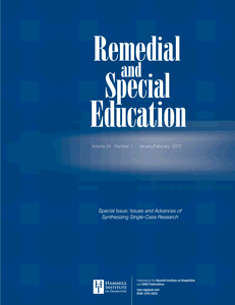
REMEDIAL AND SPECIAL EDUCATION
Advancing Knowledge for Exceptional LearnersREMEDIAL AND SPECIAL EDUCATION is a premier journal published by SAGE Publications Inc, dedicated to advancing the fields of education and public health. With an impressive legacy that spans from 1984 to 2024, this bi-monthly journal plays a pivotal role in disseminating cutting-edge research and innovative practices to support individuals with special educational needs. Ranked in the top quartile (Q1) for both Education and Public Health disciplines, and positioned in the 86th and 77th percentiles of their respective Scopus categories, this journal ensures a high visibility and significant impact rate among academics and practitioners alike. Though not open access, it offers subscription-based access, enabling a broad audience to engage with crucial findings and discussions. The journal's commitment to improving educational and health outcomes underscores its importance as a trusted source of knowledge, making it an essential read for researchers, educators, and policy-makers focused on special education and remedial strategies.
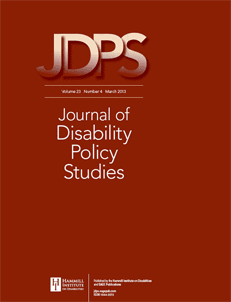
Journal of Disability Policy Studies
Bridging gaps in disability studies and practice.The Journal of Disability Policy Studies, published by SAGE Publications Inc, stands as a pivotal scholarly resource in the field of disability studies, intersecting the domains of health and law. Established in 1990, this peer-reviewed journal has cultivated a rich legacy of disseminating high-quality research, evidenced by its impressive rankings within the Q2 and Q1 quartiles respectively in Health (Social Science) and Law as of 2023. With a significant impact factor reflected in its Scopus rankings, positioning it in the 88th percentile in Law and the 60th percentile in Health, the journal serves as an essential platform for scholars and practitioners dedicated to advancing the nuanced understanding of policy issues affecting individuals with disabilities. The journal not only stimulates academic discourse but also provides valuable insights aimed at informing policy development and implementation, making it an indispensable resource for researchers, professionals, and students alike.
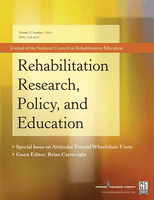
Rehabilitation Research Policy and Education
Connecting Research, Policy, and Practice in RehabilitationRehabilitation Research Policy and Education, published by Springer Publishing Co, is an essential journal dedicated to the exploration and dissemination of research findings, policies, and educational advancements in the field of rehabilitation science. With its ISSN 2168-6653 and E-ISSN 2168-6661, the journal serves as a vital resource for professionals, researchers, and students keen on understanding the complexities of rehabilitation practices, innovative therapies, and educational frameworks. While specific impact metrics such as H-Index and Scopus Ranks are yet to be determined, the journal aims to provide a platform for peer-reviewed articles that inform best practices, shape policies, and contribute to the ongoing discourse in rehabilitation. As the field evolves with new challenges and opportunities, this journal is committed to facilitating the academic exchange of ideas and empirical research that drive improvement in rehabilitation outcomes.

ADAPTED PHYSICAL ACTIVITY QUARTERLY
Exploring New Frontiers in Rehabilitation.ADAPTED PHYSICAL ACTIVITY QUARTERLY is a leading peer-reviewed journal published by Human Kinetics, dedicated to the exploration of innovative approaches in adapted physical activity. Established in 1988, this esteemed journal serves as a crucial platform for researchers, practitioners, and students in the fields of Physical Therapy, Sports Therapy, and Rehabilitation, boasting a commendable Impact Factor and a solid reputation reflected in its Q2 quartile ranking in Physical Therapy and Rehabilitation, as well as Q3 in Sports Science according to the latest metrics. With a clear focus on enhancing the quality of life through physical activity, ADAPTED PHYSICAL ACTIVITY QUARTERLY encourages groundbreaking research and discussion on the development of adapted physical practices. Researchers in related disciplines will find a wealth of insightful studies, timely discussions, and practical applications aimed at promoting inclusive fitness and rehabilitation. As a non-open access journal, ADAPTED PHYSICAL ACTIVITY QUARTERLY is essential for those committed to advancing the understanding and implementation of adapted physical activities across diverse populations.

AJIDD-American Journal on Intellectual and Developmental Disabilities
Pioneering Insights in Intellectual and Developmental Disabilities.Welcome to the AJIDD - American Journal on Intellectual and Developmental Disabilities, a leading publication dedicated to advancing knowledge in the fields of intellectual and developmental disabilities. Published by the American Association on Intellectual and Developmental Disabilities (AAIDD), this journal provides a platform for researchers, practitioners, and educators to disseminate research findings and theoretical frameworks that inform best practices and policy in care and support for individuals with disabilities. With an impressive impact factor reflected in its Q1 placement in Arts and Humanities and commendable rankings across several medical and psychological categories in 2023, AJIDD is a critical resource for those passionate about enhancing the quality of life for those affected by these conditions. The journal, accessible through open-access options to broaden its reach and impact, spans articles addressing innovative research methodologies and interdisciplinary approaches, thus fostering dialogue and collaboration among professionals. Join us in exploring the pivotal research that shapes the future of intellectual and developmental disabilities from 2009 through 2024 and beyond.

Journal of Postsecondary Education and Disability
Shaping the Future of Accessible Learning Environments.The Journal of Postsecondary Education and Disability (ISSN: 2379-7762; E-ISSN: 2328-3343), published by the Association on Higher Education and Disability (AHEAD), stands as an essential resource for researchers, professionals, and students dedicated to the study and enhancement of postsecondary education for individuals with disabilities. This esteemed journal aims to foster a deeper understanding of accessibility issues, inclusive practices, and policy development within higher education contexts, thereby facilitating academic discourse and innovative solutions. With its commitment to advancing knowledge and promoting best practices, the journal serves as a pivotal platform for sharing empirical research, theoretical discussions, and case studies that address the multifaceted challenges faced by students with disabilities. By providing high-quality content that bridges research and practice, the Journal of Postsecondary Education and Disability plays a critical role in shaping inclusive educational environments and empowering diverse student populations.
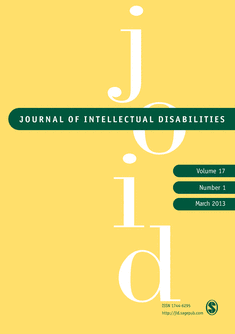
Journal of Intellectual Disabilities
Fostering interdisciplinary dialogue for change.Journal of Intellectual Disabilities is a distinguished publication housed under SAGE Publications Ltd, dedicated to advancing the field of intellectual disabilities and enhancing the understanding of associated complexities in health and mental well-being. Established in 2005, this reputable journal stands out with an impressive Scopus rank in the 87th percentile for Health Professions (miscellaneous) and a Q2 quartile ranking, reinforcing its commitment to high-quality research and clinical practice. The journal aims to serve as a vital platform for interdisciplinary discourse among researchers, clinicians, and students, focusing on empirical research, innovative interventions, and policy advocacy to further improve the lives of individuals with intellectual disabilities. Based in the United Kingdom, the journal is not only pivotal in contributing to scholarly discussions but also in shaping the future of practices and policies in the field, making it an essential resource for anyone invested in the mental health and well-being of this population.

Life Span and Disability
Transforming research into impactful solutions.Life Span and Disability is a pioneering open-access journal dedicated to advancing knowledge in the realms of life-span studies, developmental psychology, and health sciences. Published by CITTA APERTA EDIZIONI SRL in Italy, this journal has been at the forefront of disseminating research since its inception in 2005, embracing open-access principles since 2009 to ensure broad accessibility to its valuable content. With an ISSN of 1721-0151 and an E-ISSN of 2035-5963, it serves as a vital resource for researchers, professionals, and educators interested in understanding the multifaceted aspects of human development and disability across the lifespan. Although currently positioned in the Q4 quartile of relevant categories in 2023, the journal provides an essential platform for emerging research, and its commitment to expanding the discourse in its fields contributes significantly to knowledge sharing and innovation. By exploring themes that intersect social sciences, psychology, and health, Life Span and Disability invites contributions that enhance our comprehension of human growth and the implications of disability, making it a critical publication for those dedicated to improving life quality through interdisciplinary research.